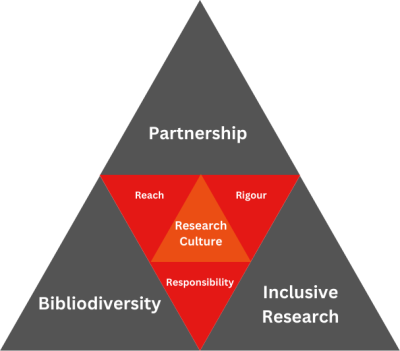Open Research Position Statement & Principles
University of Waikato's Open Research Position Statement promotes inclusive, responsible research grounded in Te Tiriti and Māori data sovereignty.
Background
The Open Research position statement is the foundational building block to develop the University’s articulation of its approach to open. In turn, this will support the normalisation of a research culture it wants to foster and develop. Research culture encompasses the behaviours, values, expectations, attitudes, and norms of our research communities. It influences researchers’ career paths and determines the way that research is conducted and communicated.
Purpose of the statement
Te Pōkai Tara l Universities New Zealand released an Open Access Statement in 2023 on behalf of New Zealand's eight universities. It acknowledges the rights of Māori and other Indigenous groups to determine the appropriate avenues for their data and sets out the determination of member universities to continue to pursue open access. Open Access is one facet of Open Research and we believe that taking a more holistic approach and broader perspective will place Waikato in a strong position to determine the research culture we want to foster at the University.
While Open Research Position Statements are common overseas, no university in Aotearoa New Zealand has stated their position in this area. This document, informed by the University’s Te Tiriti Statement, Te Kāhui Raraunga’s Māori Data Governance Model and Te Mana Raraunga’s charter, aims to allow the University to leverage Open Research practices for greater impact whilst honouring the unique context in which the University of Waikato operates.
Open Research Position Statement Te Whare Wānanga o Waikato l University of Waikato
Open Research describes a range of processes and practices that aim to improve the reach, reproducibility, and rigour of research. These processes and practices differ according to discipline and can fall under the broad areas of Open Access, Open Educational Resources, Research Data Management and Open Data, among others. The University supports and promotes Open Research to enhance collaboration, resulting in a more vibrant, diverse and inclusive research culture that can expand beyond the academy and ultimately translate into societal impact.
As an institution committed to the principles of Te Tiriti o Waitangi, the University recognises that Māori have rangatiratanga, or right of governance and control over knowledge produced by, for and about them and their environments. In the context of Open Research, this is demonstrated in the University’s commitment to upholding the tenets of Māori data sovereignty (in alignment with the CARE & FAIR principles and Te Mana Raraunga’s charter).
This statement does not assume that everything can or should be made open—cultural, ethical, and security considerations as well as commercial restrictions will in many cases preclude the application of some Open Research practices. Open Research aims to make things as open as possible and closed as necessary and researchers are encouraged to embrace this responsibility and make decisions accordingly across the research lifecycle.
Principles

Six principles accompany the statement:
- Partnership
- Responsibility
- Reach
- Bibliodiversity
- Rigour
- Inclusive
The purpose of the principles is to breathe life into the statement, and provide a framework which researchers can use to guide their decision-making across the research lifecycle. This document provides more comprehensive details on the Open Research Position Statement Principles.
Definitions
Kaupapa Māori research is research that is by Māori, for Māori, and with Māori. It is research over which Māori have conceptual, design, methodological, and interpretive control.
Māori data refers to digital or digitisable information or knowledge (including mātauranga Māori) that is about or from Māori people, language, culture, resources, or environments.
The inherent rights and interests that Māori have in relation to the collection, ownership and application of Māori data.
Māori Data Sovereignty recognises that Māori data should be subject to Māori governance. Māori data sovereignty supports tribal sovereignty and the realisation of Māori and iwi aspirations. Data is a living taonga and is of strategic value to Māori.
As the concept of data sovereignty posits that data is subject to the laws of the nation within which it is stored, the management and storage of research data produced by researchers at the University of Waikato should be of concern to the institution. As outlined in the charter of Te Mana Raraunga (Māori Data Sovereignty Network), Māori data should be subject to the rights articulated in the Treaty of Waitangi and the UN’s Declaration on the rights of Indigenous Peoples (UNDRIP), to which Aotearoa New Zealand is a signatory.
By "open access" to this literature, we mean its free availability on the public internet, permitting any users to read, download, copy, distribute, print, search, or link to the full texts of these articles, crawl them for indexing, pass them as data to software, or use them for any other lawful purpose, without financial, legal, or technical barriers other than those inseparable from gaining access to the internet itself.
Open data refers to making research data and content freely usable, modifiable, and sharable. Some data cannot be made open for cultural, ethical, legal, security or commercial reasons. For example, content that should be subject to Indigenous governance and control (in alignment with the CARE and FAIR principles).
The process of organising, storing and preserving research data across the whole span of the research lifecycle, including making decisions regarding the protection or sharing of the data, according to the cultural or ethical nature of the data.
Research culture encompasses the behaviours, values, expectations, attitudes, and norms of our research communities. It influences researchers’ career paths and determines the way that research is conducted and communicated.
Source: Royal Society London.
The Open Research Position Statement was endorsed by the Research Committee in August 2023.